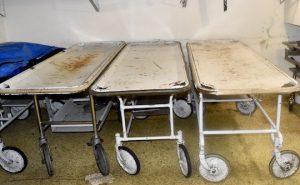The seventh session of the Crebilly 2 conditional use hearing featured testimony from Westtown Township's engineer who said Toll Bros. needs to improve its plan. Robert Flinchbaugh, of Cedarville Engineering, specifically cited the need to improve the plan so that homes and roads don't encroach into the riparian buffer.
A riparian buffer is a vegetated area around a stream that provides habitat for wildlife and protects the stream from silt runoff. In all, buffers improve water quality. However, Flinchbaugh said, some of the roads and homes on the plan encroach on that buffer. Township code requires no land disturbance within 75 feet of the buffer.
 Encroaching on the buffer further degrades Radley Run and Chester Creek, both of which, he said, are already impaired, according to the Pennsylvania Department of Environmental Protection. His comments came during direct questioning from Westtown Planning Commission solicitor Kristin Camp.
Encroaching on the buffer further degrades Radley Run and Chester Creek, both of which, he said, are already impaired, according to the Pennsylvania Department of Environmental Protection. His comments came during direct questioning from Westtown Planning Commission solicitor Kristin Camp.
Camp asked him during the Dec. 16 hearing if there was enough information on the plan for him to conclude whether the proposed location of a stormwater basin could be implemented without the encroachment.
"Basins, yes," he said, "but the grading associated with the anticipated locations of the houses and roadways, no."
He also affirmed it's more important to preserve a riparian buffer if the stream it surrounds is impaired and specifically mentioned the degraded status of Radley Run and Chester Creek, which take runoff from steams on the Crebilly site.
Flinchbaugh continued his testimony, saying he agrees with a Planning Commission recommendation that deed restrictions should be incorporated into the plan to prevent encroachment.
"Do you believe that that's an important condition for the board to impose?" Camp said.
"Yes," he said.
He also said Toll should cooperate with the township to implement stream restoration on portions of Radley Run that are already eroding. The Stormwater Management Ordinance requires such restoration, he said, adding that he disagrees with Toll when the applicant claims it isn't needed.
Camp then moved her questioning to impervious coverage.
Flinchbaugh said, "It's important to restrict the amount of impervious coverage per lot to the maximum based upon what the design the stormwater management facilities were designed to handle." He also said the zoning code sets limits on the amount of impervious cover for the townhomes.
He said the maximum impervious cover is 45 percent, but Toll has not proven it can meet that requirement, he said.
"Additional clarification is required as to how the percentage, as presented [on the plan], was derived. The applicant has provided an amount of impervious coverage per unit, but it remains unclear how the percentage was determined."
He said limiting impervious coverage would ensure water quality by maximizing groundwater protection and meeting the township's pollution reduction requirements. Flinchbaugh added, however, that could be worked out in the land development plan, which would follow conditional use approval.
Flinchbaugh's cross-examination will occur during the next session planned for 7 p.m. on Jan. 26 via Zoom.
Toll wants to build 317 new homes on the 322-plus-acre farm bordered by Routes 202 and 926 on the east and south, and S. New Street and W. Pleasant Grove Road on the west and north.
About Rich Schwartzman
Rich Schwartzman has been reporting on events in the greater Chadds Ford area since September 2001 when he became the founding editor of The Chadds Ford Post. In April 2009 he became managing editor of ChaddsFordLive. He is also an award-winning photographer.



Comments